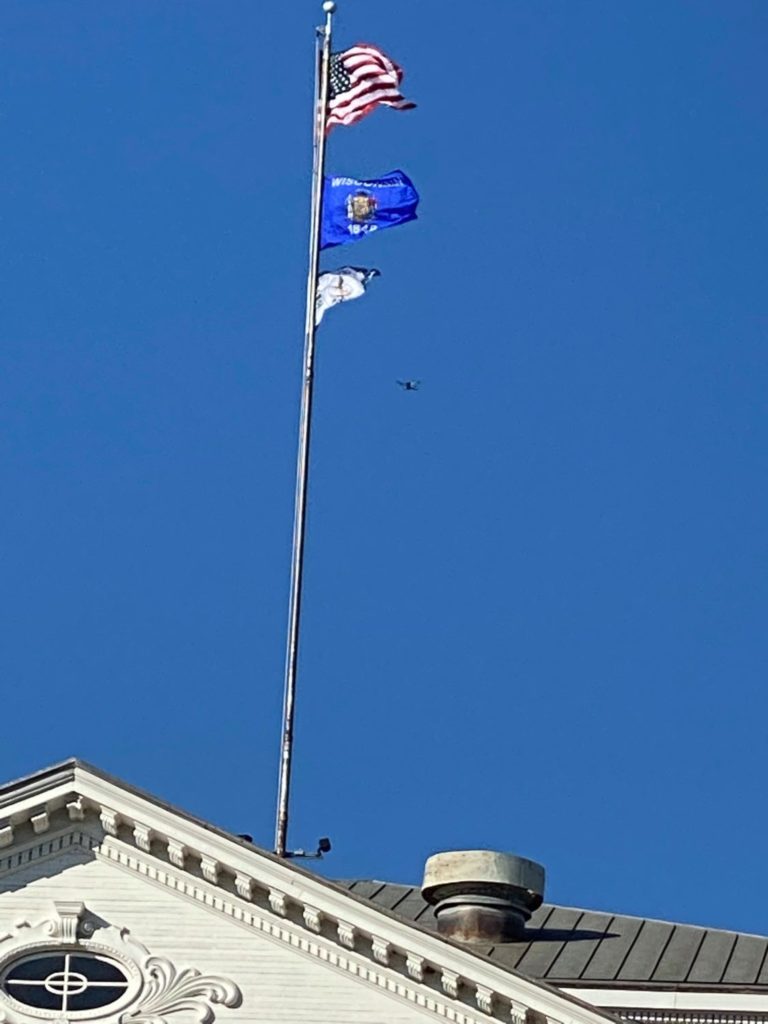
In honor of National Native American Heritage Month, for the first time in history, the University of Wisconsin-Madison flew the Ho-Chunk Nation’s flag above Bascom Hall for a ceremony, Friday, November 5th, as part of their Our Shared Future Initiative — but some feel one day wasn’t enough.
“The Our Shared Future Initiative, in the Chancellor’s words, is trying to move us from ignorance to awareness,” said Aaron Bird Bear, Director of Tribal Relations at UW-Madison. “Four out of five people know little to nothing about Native Americans as an outcome of settler colonialism. Our goal is just to raise awareness of tribal governance, tribal sovereignty, and cultures of Indigenous nations. because we’re a place of teaching and learning. We do research, teaching and learning and service. Our first part is making sure we educate ourselves with the most current information that we have. Part of the flag raising was really in this movement that started in 2019, with our shared future heritage marker to better educate the faculty, staff, and students about this particular place. and whose ancestral lands this institution is located upon.”
There will be many events held at UW-Madison honoring Indigenous people. This week, there will be an arts and crafts event at the American Indian Student & Cultural Center and a discussion featuring Lakota Harden in Varsity Hall II in Union South. There will also be a virtual event, which includes the streaming of More than a Word, followed by a discussion with the documentary’s director, John Little. Details on those and more events are listed on the UW-Madison included in Native American Heritage Month website.
Some Indigenous leaders, however, took to social media to critique the decision to leave the flag up for only six hours, from 10 am to 4 pm on November 5.

Monona Alder Kristie Goforth, a member of the Sault St Marie Band of Chippewa, called it a “PR stunt” in a Facebook post.
In a comment on the same post, Ho-Chunk Nation legislator Kristin White Eagle wrote, “I will acknowledge that this particular event was a baby step towards positive change so it gives me hope.”
Bird Bear said it was more than a stunt, though.
“In the culture, they do it for one day,” Bird Bear said. “When they do it at high schools and other events, it’s been a day activity. When it was suggested as a one-day activity, it didn’t seem unusual since they sometimes do one day flag raisings at public high schools, and other places where a lot of Ho-Chunk youth are enrolled in those particular high schools. For me, although the city of Madison made a choice to do it every day, we’ve witnessed these activities where they’ve just been one day activities. And so that’s how we began as a teaching and learning enterprise of how they’ve done one day activities with other school districts in the state.”
Although one day flag raising ceremonies occur in many venues, former Ho-Chunk legislator Carly Lincoln said it wasn’t enough.
“We (Ho-Chunk Nation) do a flag raising and I’ve seen them, especially up in like Black River and our executive buildings,” said Lincoln, who was an Elected Legislative Representative of the Ho-Chunk Nation from July 2017 to September 2019. “They absolutely do raise them for one day (in some venues). But why was it done by UW for only one day? Wouldn’t it be a bigger gesture to do it multiple times? I’m sorry, but we live in a universe of a ton of possibilities to show that we are still here. And to be limited only by a flag raising for one day. They wanted to do something historic, they could have at least put it up for the entire month. Or come up with something else, dig deeper. Come on, this is an institution of higher learning.”
Lincoln said she hopes that leaders at UW-Madison will be open to a conversation about what more can be done to truly honor and respect the lives of the Ho-Chunk Nation and other indigenous tribes throughout the state of Wisconsin.
“I would like to hear a response to this,” said Lincoln. “I would like, it doesn’t have to be with me, a sit down to continue a true dialogue and a true response as to what does it mean to be mindful of our history? Again, those are the words of the university. I don’t accept us being a product of what history has thrown at us. You know, we’re still here. And we demand that kind of respect. Own up to the fact—if this was a PR stunt, or if you really are committed to a shared future, and if you really are truly mindful of history. Again, this is an institution of higher learning and I expect mountains above what was done here.”



